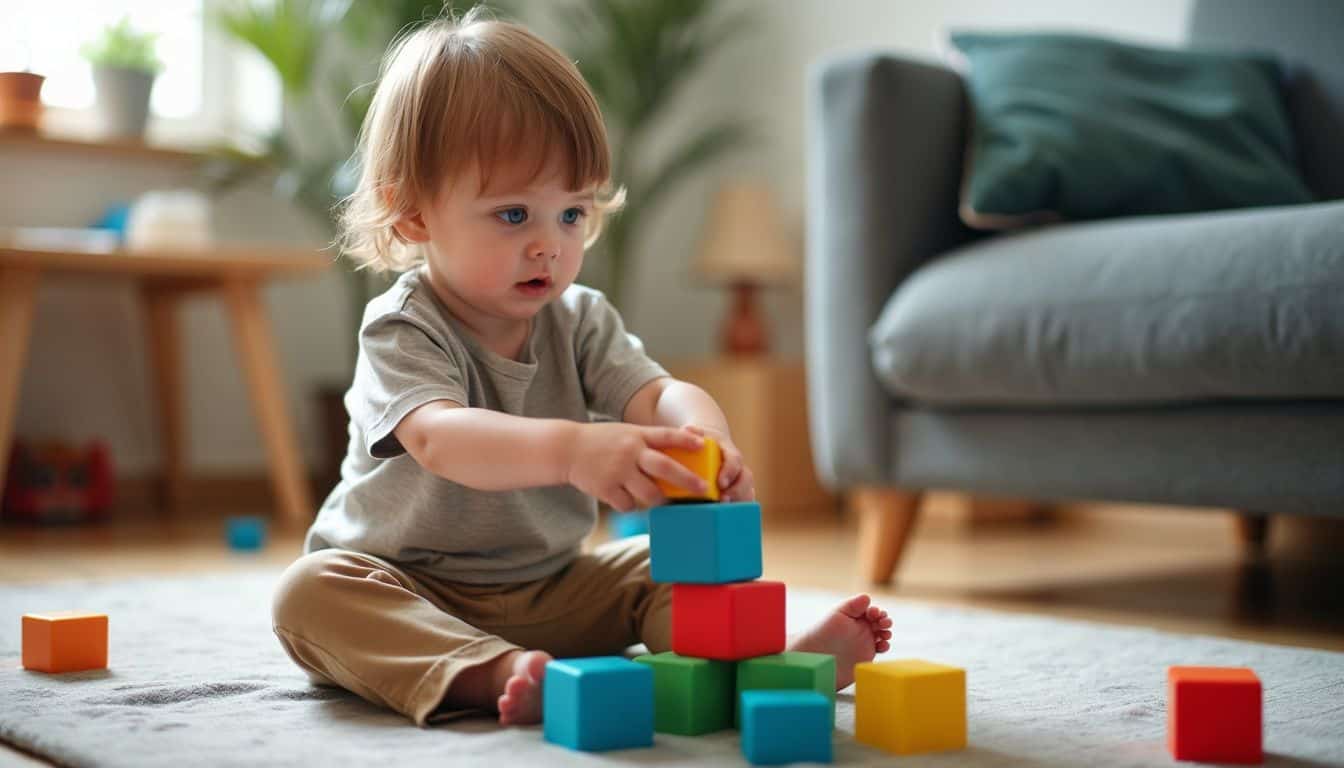As a mom, you might worry if your child isn’t hitting milestones like their peers. What are some symptoms of developmental delays? It’s a question many parents grapple with. Developmental delays can affect a child’s growth in various areas – from speech to motor skills.
This article will highlight 11 key signs to watch for, helping you spot potential issues early. Ready to become a savvy milestone detective?
Key Takeaways
Developmental delays happen when kids don’t hit milestones on time in areas like speech, motor skills, thinking, or social skills.
Common types include speech/language, motor, cognitive, social/emotional, and vision delays. Global delays affect at least two areas for 6+ months.
Key signs in babies (0-12 months) include weak reflexes, poor visual tracking, delayed motor skills, and reduced babbling.
For toddlers (18 months-4 years), watch for speech issues, social challenges, and trouble with fine/gross motor skills.
Trust your gut and talk to a doctor if you notice missing milestones or skill regression. Early help can make a big difference.
Table of Contents
What Are Developmental Delays?
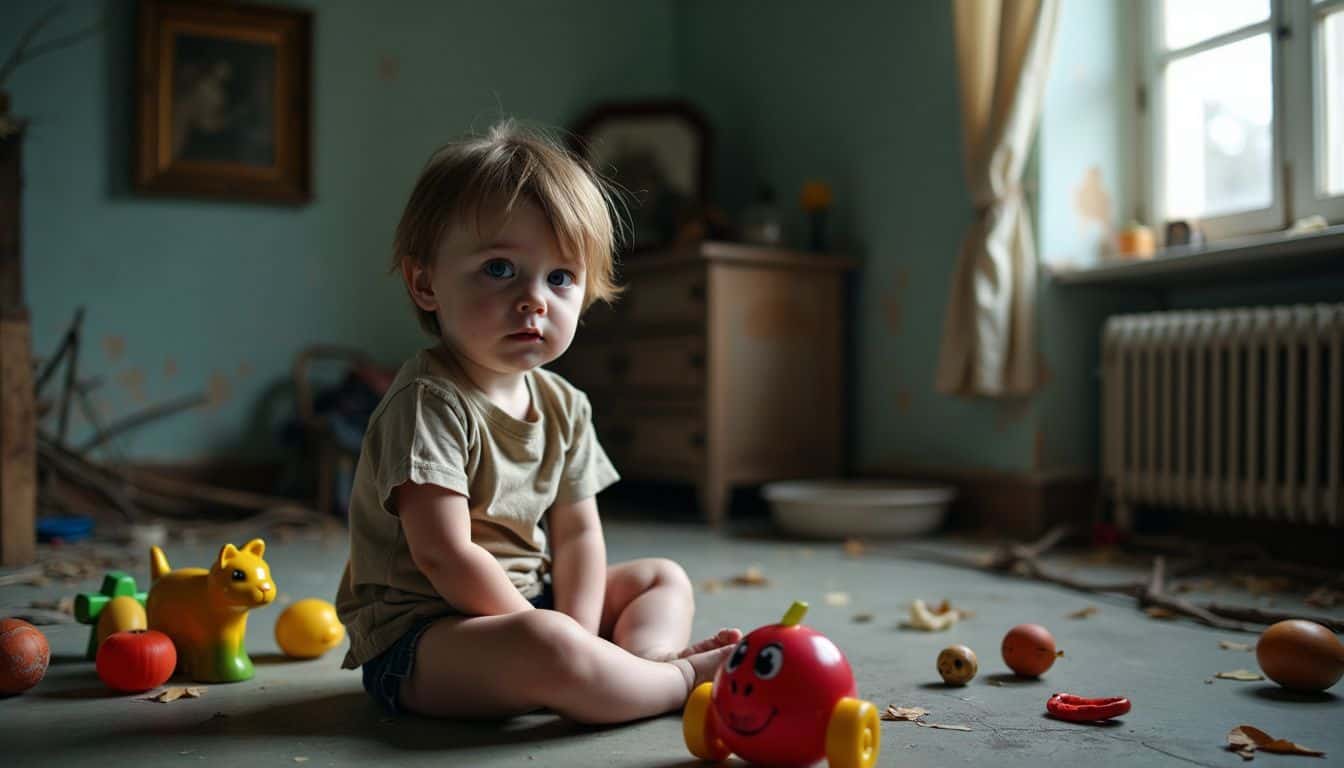
Kids grow at their own pace, but sometimes they fall behind. Developmental delays happen when a child doesn’t hit key milestones on time. It’s like a road trip where some pit stops take longer than expected.
Defining Developmental Delays
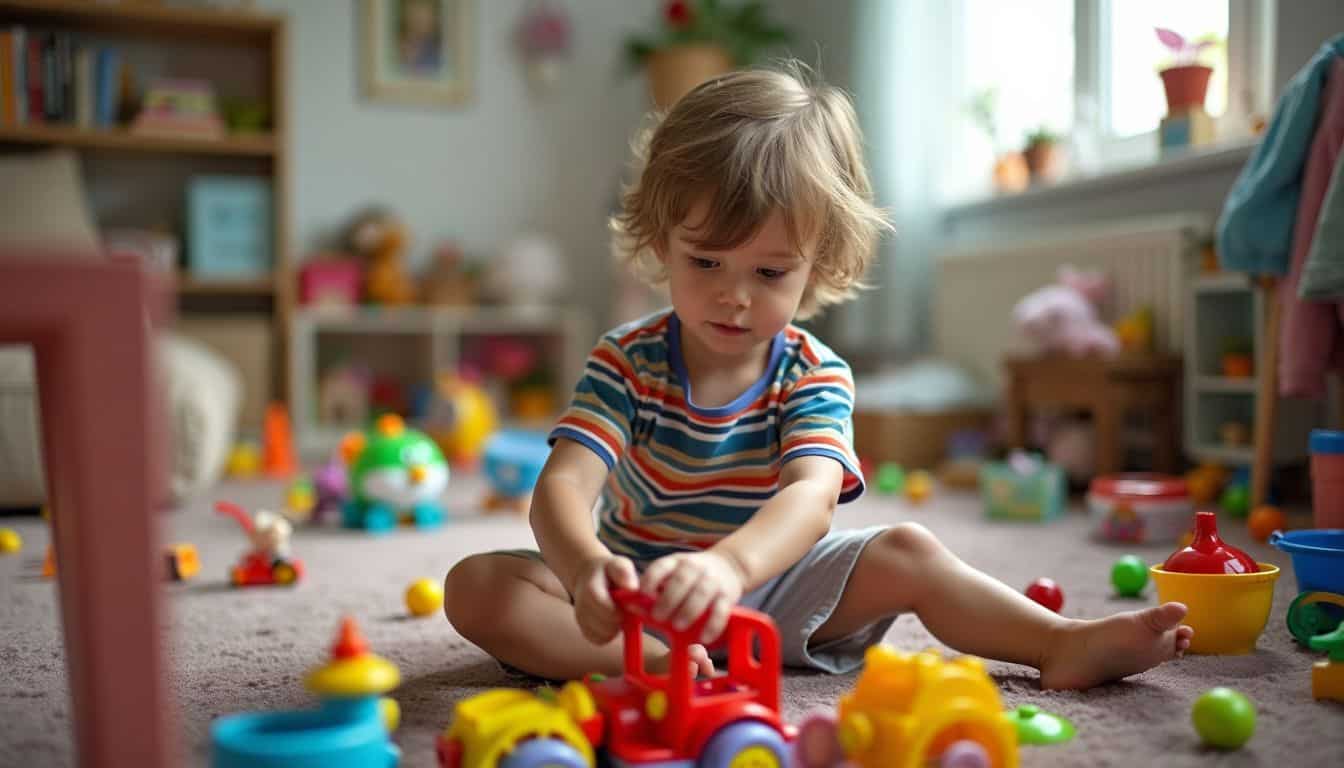
Developmental delays happen when kids don’t hit milestones on time. It’s like a growth chart for skills – some kids zoom ahead, others take their sweet time. These delays can pop up in talking, moving, thinking, or playing with others.
Unlike lifelong conditions such as cerebral palsy or autism, delays might be temporary speed bumps. But they’re still worth watching.
Spotting these hiccups early can make a big difference. Doctors look for significant lags in two or more areas lasting at least six months. This is called global developmental delay.
It’s not about comparing your kiddo to the neighbor’s little genius. It’s about making sure they’re on track for their age. If you notice any developmental red flags for 5-year-olds, don’t panic – just chat with your doc.
Every child blooms in their own time, but it’s our job to provide the right soil and sunshine.
Common Types of Developmental Delays
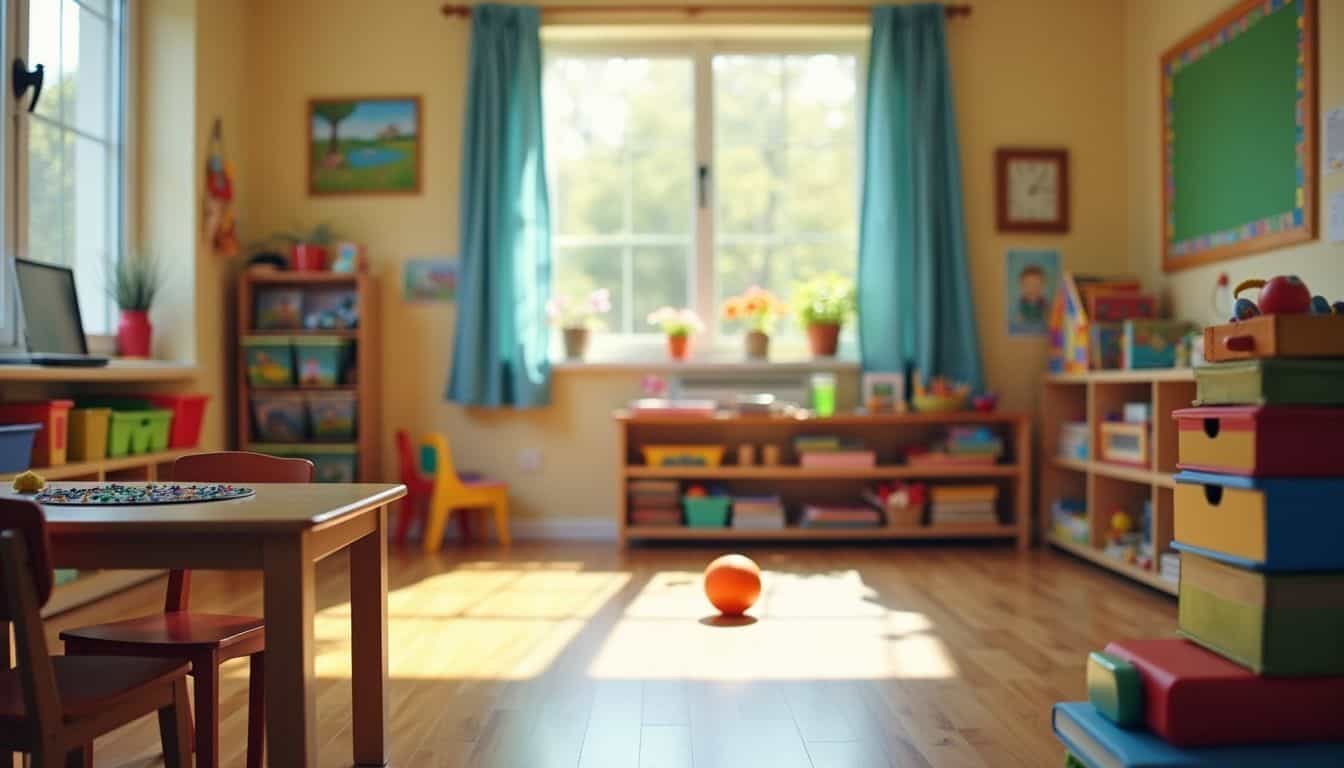
Now that we’ve defined developmental delays, let’s look at the common types. Moms, you might notice these in your little ones as they grow. Here’s what to look out for:
- Speech and Language Delays: These are the most common in toddlers. Your child might have trouble babbling, forming words, or understanding simple commands.
- Motor Skill Delays: This includes both fine and gross motor skills. Your kiddo might find it hard to crawl, walk, or use small objects like crayons.
- Cognitive Delays: These affect thinking and learning. Your child may find it difficult to solve problems or recall things.
- Social and Emotional Delays: Your little one might not smile, make eye contact, or play well with others.
- Vision Delays: This could involve issues like lazy eye or difficulty tracking moving objects.
- Global Developmental Delay: This affects at least two areas of development for six months or more in babies and preschoolers.
Every child grows at their own pace. But if you notice any of these signs, it’s good to talk with your doctor. Early help can make a big difference!
Early Signs of Developmental Delays in Newborns (0-2 Months)
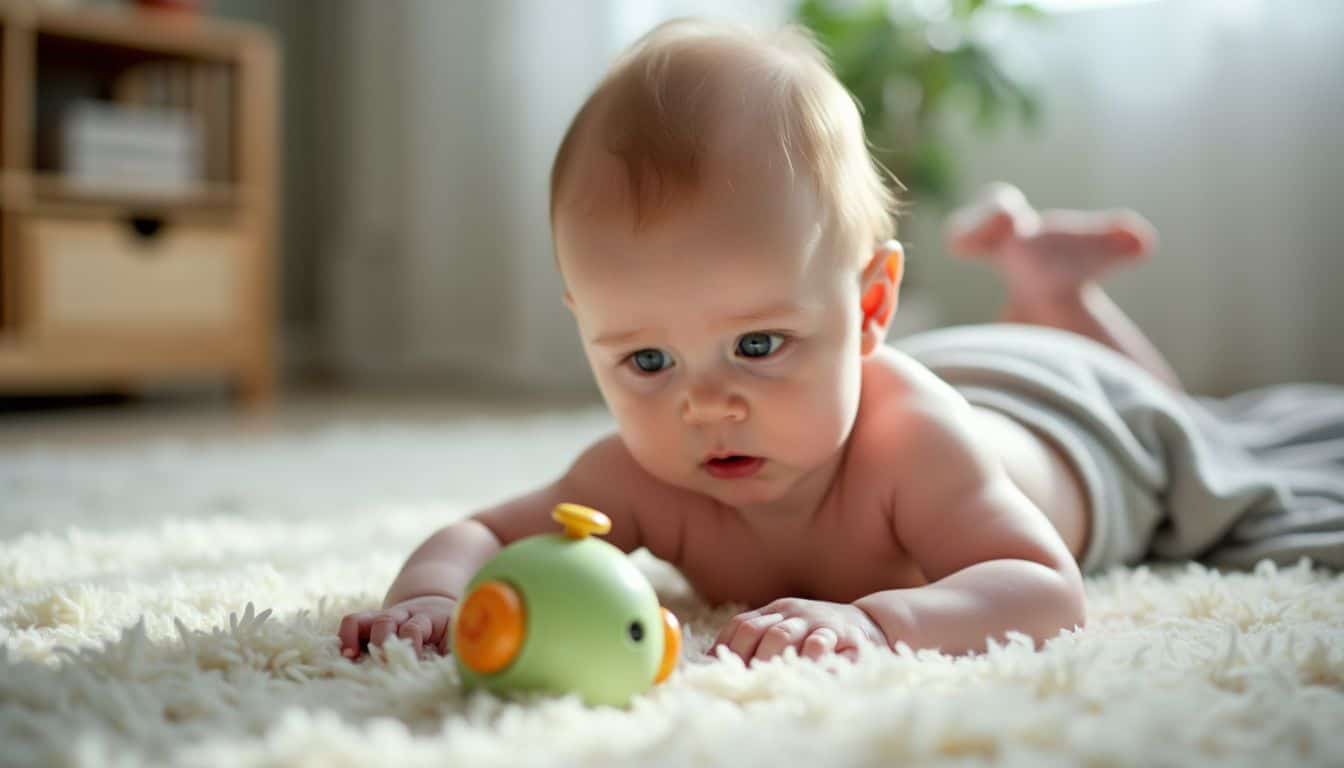
Newborns can show signs of developmental delays early on. Keep an eye out for weak reflexes and trouble tracking objects with their eyes.
Weak Reflex Actions
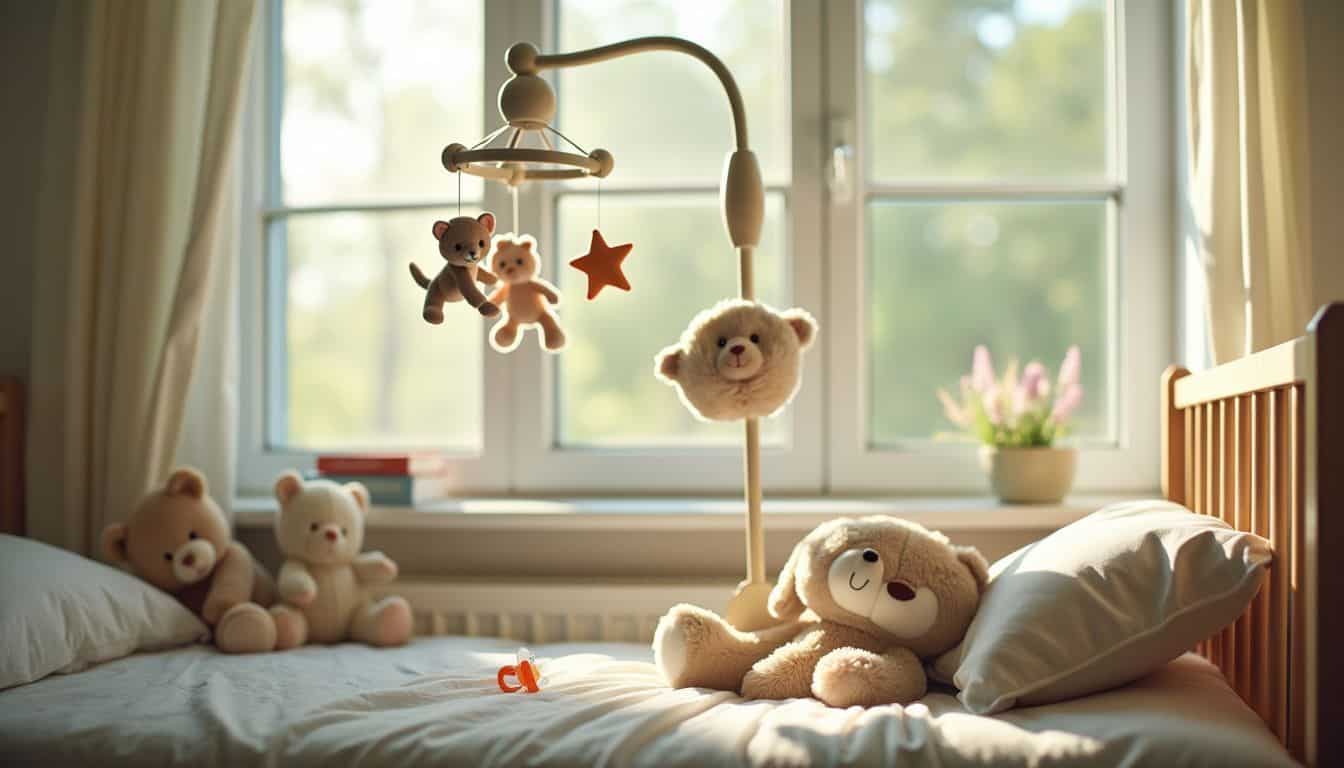
Babies come with built-in reflexes. These are automatic responses that help them survive and grow. But sometimes, these reflexes aren’t as strong as they should be. This could be a red flag for developmental delays.
Doctors check for these reflexes during check-ups. They look at how a baby reacts to certain touches or movements.
Weak reflexes might mean the baby’s nervous system isn’t working right. It could point to issues with muscle tone or brain development. If you notice your little one isn’t responding as expected, don’t panic.
Talk to your pediatrician. They can do more tests and suggest next steps. Early help can make a big difference in your child’s growth.
Lack of Visual Tracking Ability
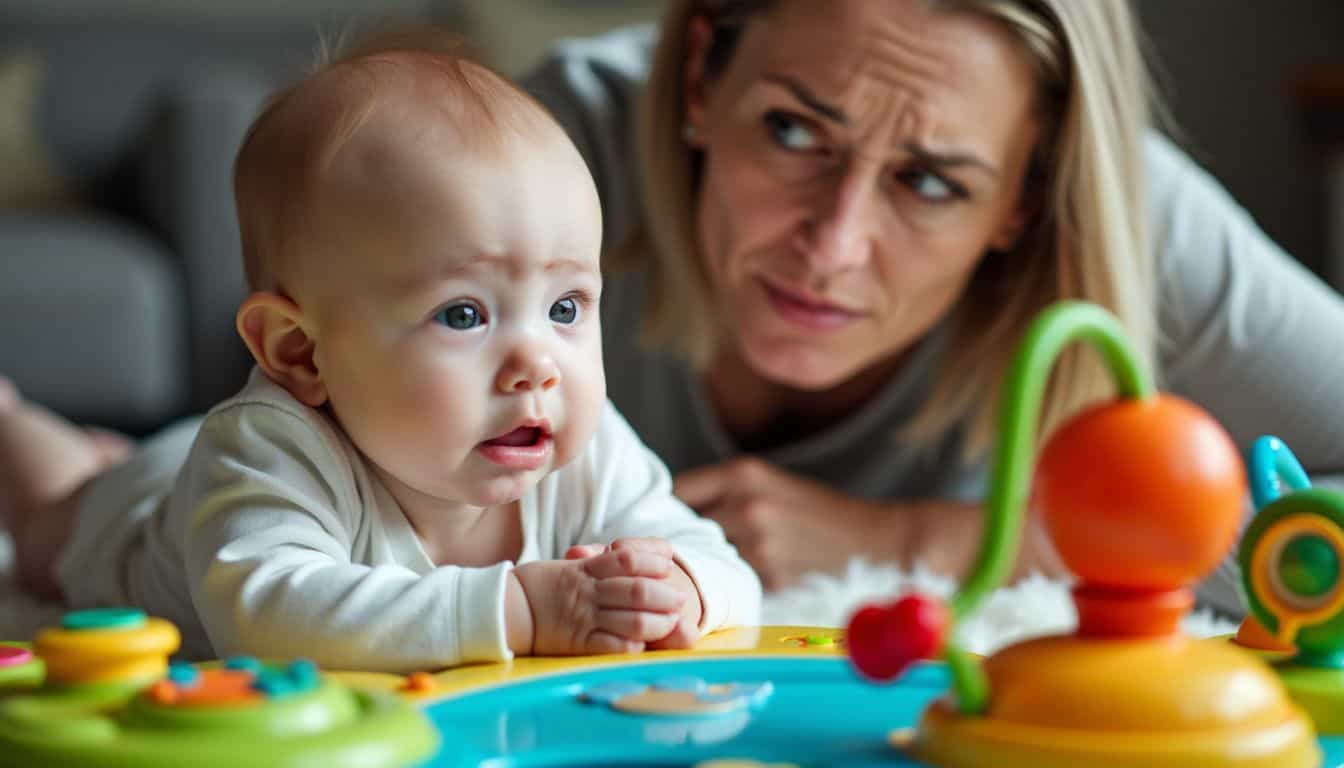
Babies need to learn how to follow moving objects with their eyes. It’s a key skill that helps them explore their world. By 3 months, most infants can track things like toys or faces as they move.
But some babies struggle with this. They might not notice their own hands or follow a parent’s face. This could point to vision problems or other delays.
Don’t panic if your little one isn’t tracking perfectly yet. Every baby grows at their own pace. Still, it’s smart to keep an eye out for this skill. If your 3-month-old isn’t following moving objects, chat with your doctor.
They can check for any issues and suggest next steps. Early help can make a big difference for babies who need extra support with their vision or development.
Recognizing Symptoms in Infants (Up to 12 Months)
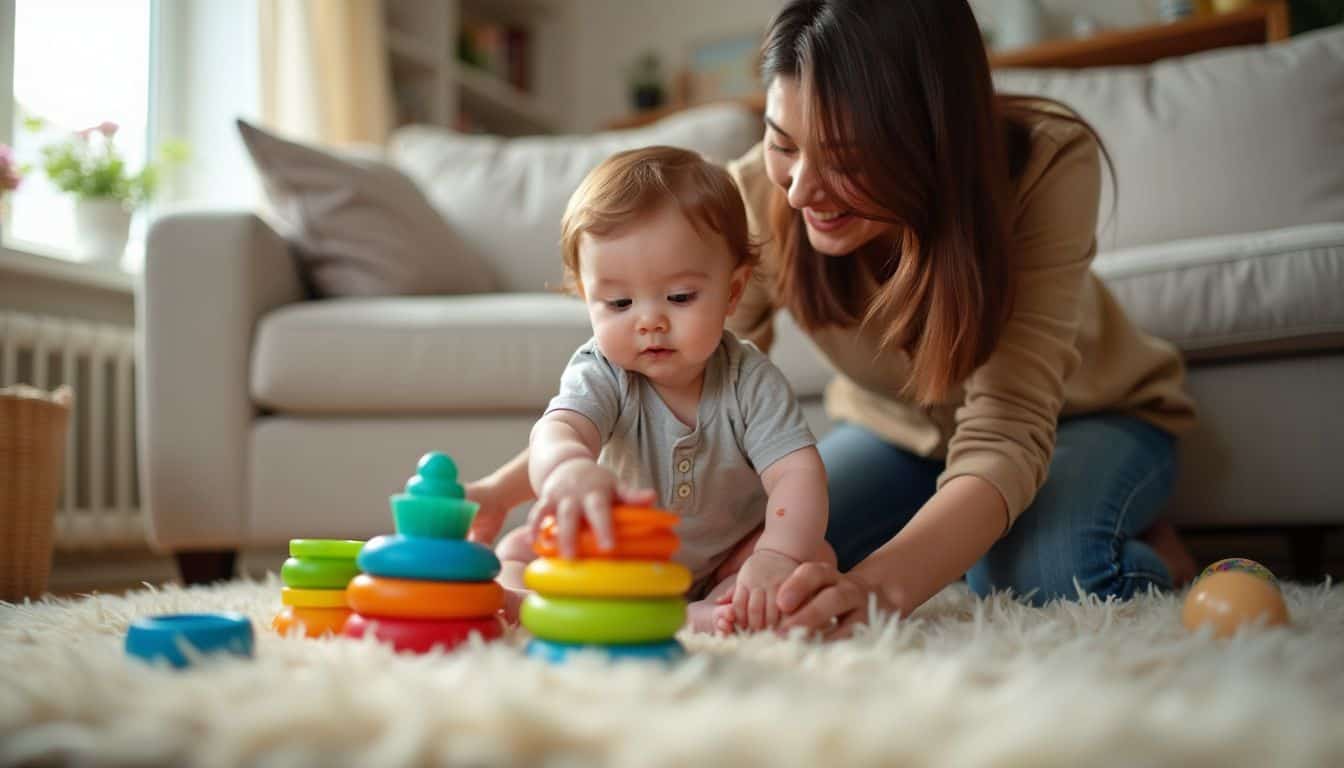
Babies grow fast, but some hit milestones slower than others. Keep an eye out for delays in motor skills and speech – they could be early signs of something bigger.
Delay in Developing Motor Skills
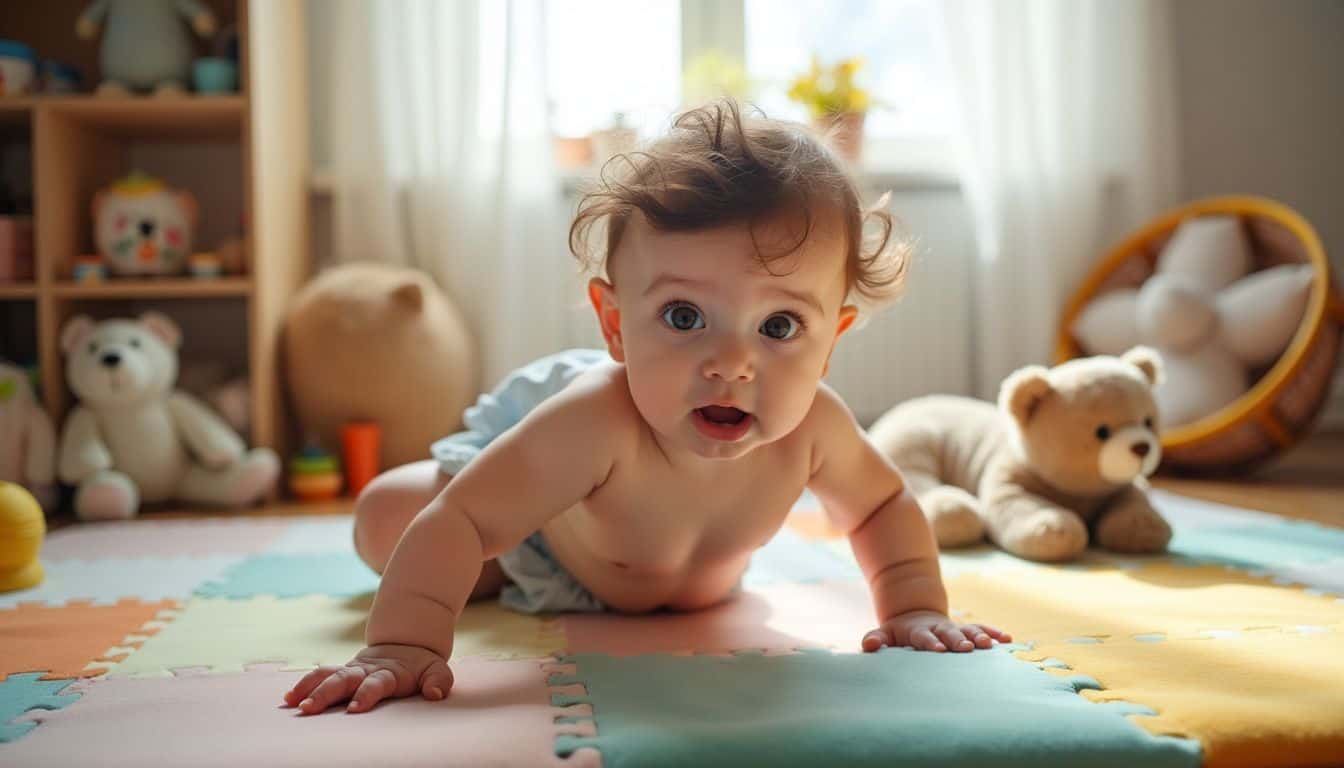
Babies grow fast, but some take longer to move their bodies. By 3 to 4 months, most can grab toys. If your little one can’t, it might be a sign to watch. Motor skills are how we use our muscles to do things.
Some babies are slow to roll, crawl, or sit up on their own. Don’t worry if your 7-month-old isn’t rolling yet. But if muscles feel too stiff or floppy, it’s worth a chat with the doctor.
Crawling is important for babies. Most start by 1-year-old. If your child isn’t trying to move around by then, it could mean a delay. Keep in mind, every baby grows at their own pace.
But if you’re worried, trust your gut. Early help can make a big difference. Talk to your pediatrician about any concerns. They can check if your baby needs extra support to catch up.
Reduced Babbling or Making Sounds
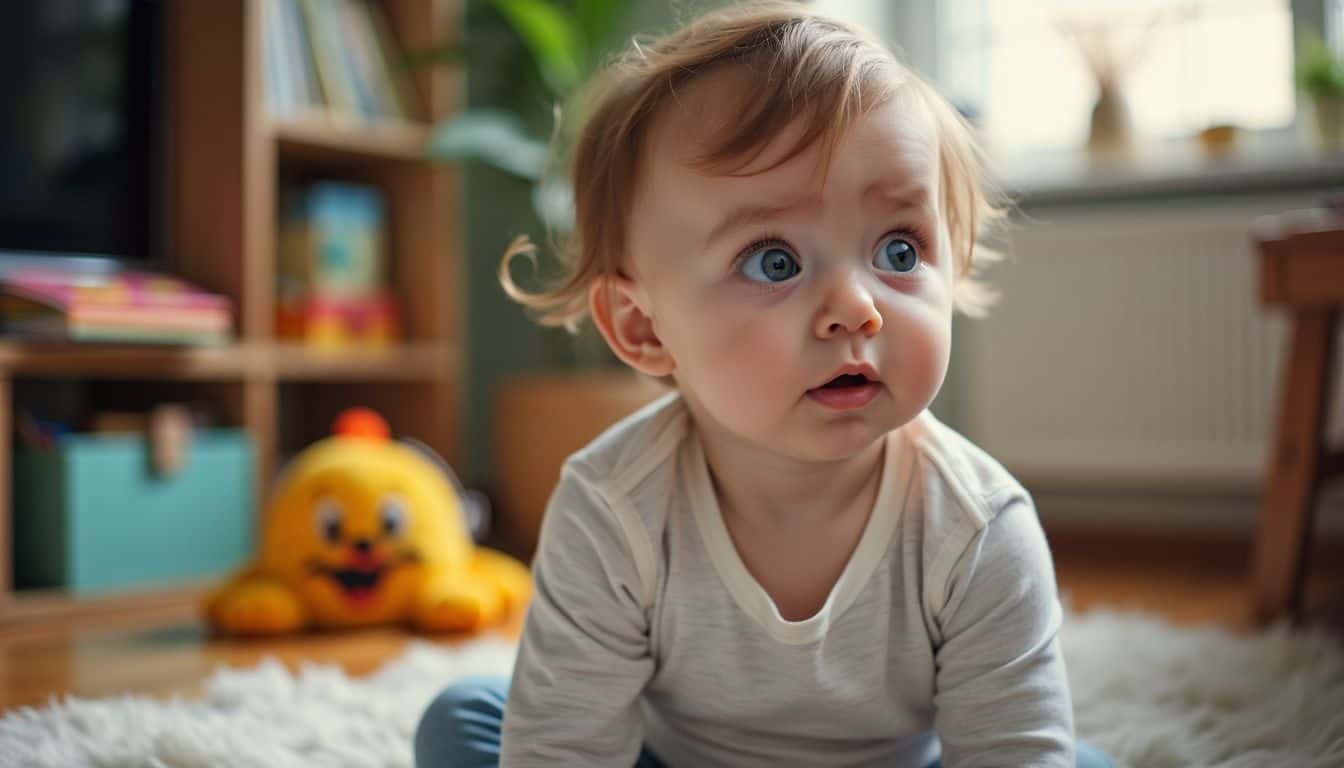
Babies usually start babbling around 4 months old. They make cute sounds like “ba-ba” or “ma-ma.” But some little ones don’t babble much. This could be a sign to keep an eye on. By 7 months, most babies take turns making noises with others.
If your baby isn’t doing this, it might be worth mentioning to the doctor.
I recall when my niece was about 6 months old. She was quiet compared to other babies her age. My sister was concerned. The pediatrician suggested some simple games to encourage babbling.
It helped! Now she’s a chatterbox. Quick action can make a big difference.
A baby’s babble is the sweetest music to a parent’s ears.
Identifying Developmental Delays in Toddlers (18 Months-4 Years)
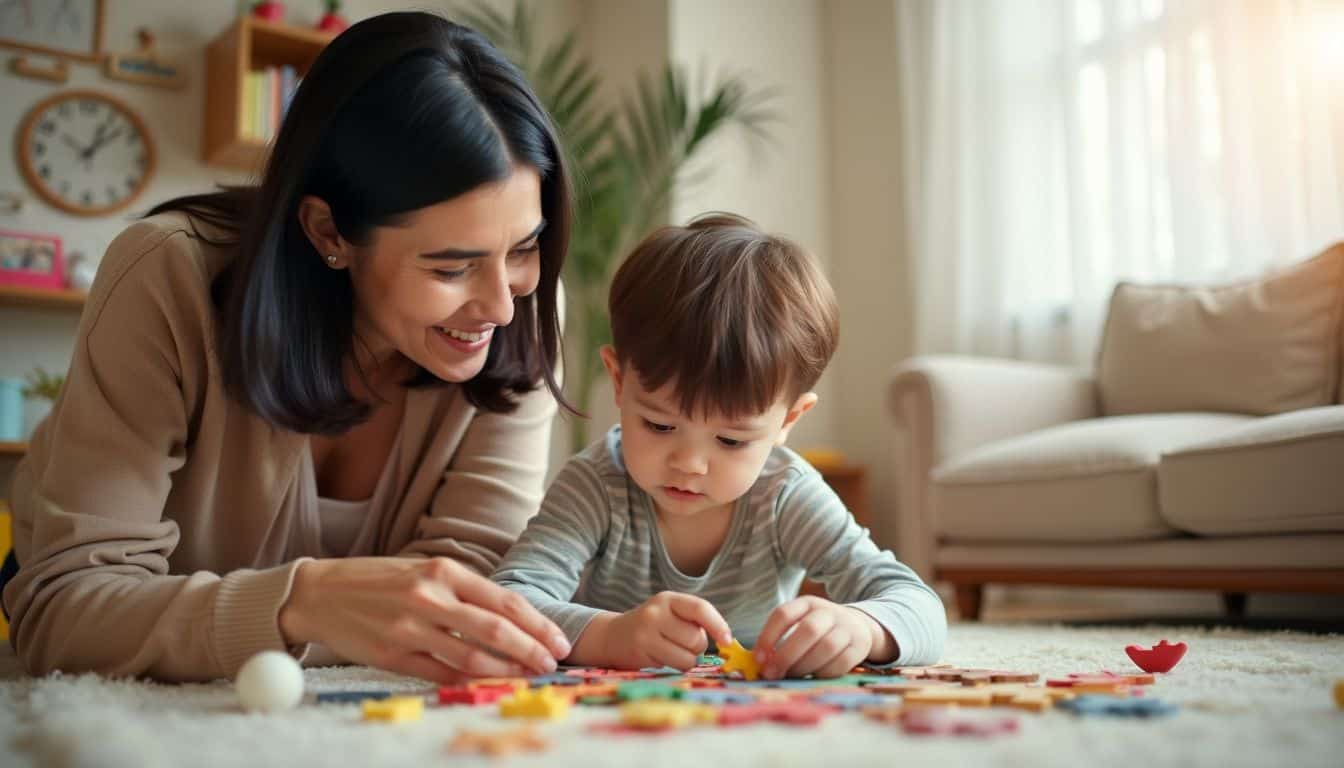
Toddlers grow fast, but some might need extra help. Watch for signs like trouble talking or playing with others – these could mean your little one needs a boost.
Speech Development Issues
Speech troubles can be a big red flag for kids. By age two, a child should say at least 15 words. If they’re only copying what others say, that’s not enough. Kids this age should also point to common things when asked.
They should follow easy directions too. If your little one isn’t doing these things, it might be time to chat with a doctor.
Don’t panic if your child isn’t a chatterbox yet. Every kid grows at their own pace. But keep an eye out for these signs. Is your two-year-old using gestures like waving bye-bye? Can they name everyday objects? Do they understand simple instructions? If not, it’s worth checking in with a pro.
Early help can make a big difference. Next, let’s look at how kids interact with others.
Challenges in Social Interaction
Kids with developmental delays often find it hard to connect with others. They might not return a smile or appear uneasy around new faces. By 7 months, some babies don’t enjoy cuddling or being around people.
This can be difficult for moms to witness.
I recall when my friend’s son didn’t laugh or coo like other babies. It concerned her. But there’s hope! Specialists can help kids develop social skills. They use specific games and techniques to teach little ones how to interact.
It’s wonderful to see a child flourish with the right support.
Every child is a different kind of flower and all together make this world a beautiful garden. – Unknown
Difficulty with Fine and Gross Motor Skills
Kids who struggle with motor skills often face daily challenges. Simple tasks like tying shoes or catching a ball can be tough. Fine motor skills involve small movements, like using scissors.
Gross motor skills are big movements, like running or jumping. When these skills lag, it can affect a child’s confidence and learning.
Help is out there, though! Physical therapy can boost gross motor skills. For fine motor delays, occupational therapy works wonders. By 18 months, most tots can walk. If not, it’s time to chat with a doctor.
Same goes if a 2-year-old can’t push a toy with wheels. Early help can make a big difference. It’s all about giving kids the tools they need to thrive and play like champs!
Cognitive and Emotional Indicators Across All Ages
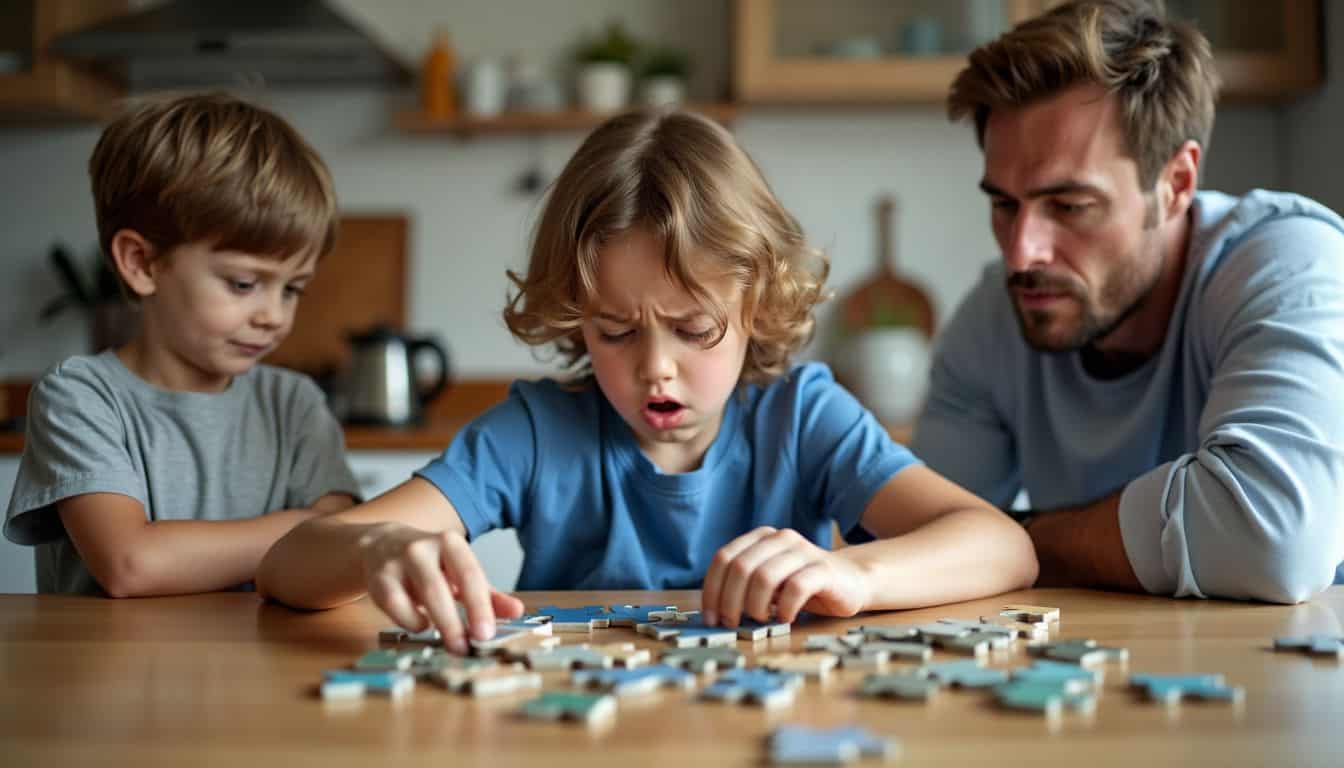
Kids’ brains work in funny ways. Sometimes, they might struggle to learn new things or feel extra shy around others. These signs can pop up at any age, so it’s good to keep an eye out.
Learning Challenges
Learning challenges can be hard to spot. Kids might have trouble with reading, writing, or math. They may find it difficult to pay attention or stay organized. These issues can appear in different ways.
A child might confuse letters, struggle to follow directions, or lose focus easily.
Every child learns differently. It’s our job to find the key that unlocks their potential.
Parents should watch for these signs. By age 2, kids should be able to name common objects and follow simple instructions. If they can’t, it might be time to talk with a doctor. Early help can make a big difference.
Speech therapy or special education could give your child the boost they need. Keep in mind, every kid is unique. What’s most important is getting them the right support to succeed.
Signs of Emotional Withdrawal or Extreme Shyness
Kids who pull away from others or seem super shy might be dealing with more than just being quiet. They may avoid eye contact, refuse to join in games, or freeze up when asked to speak.
This can be tough on moms who want their little ones to make friends and have fun. It’s not always easy to spot, but these signs could mean your child needs extra help to feel comfy around others.
If you notice your kiddo hiding behind you at parties or never wanting to play with other kids, don’t panic. Sometimes, children just need time to warm up. But if it keeps happening and seems to upset your child, it might be time to chat with a doctor.
They can help figure out if there’s more going on and give you tips to help your little one feel brave and make new pals. Now, let’s look at when it’s time to call in the pros for help.
When to Seek Professional Help

Trust your gut. If you feel something’s off with your child’s growth, don’t wait – talk to a doctor. Early help can make a big difference, so it’s better to check things out sooner rather than later.
Absence of Multiple Developmental Milestones
Missing key milestones can be a warning sign for developmental delays. Kids grow differently, but some signs need attention. If your child isn’t reaching several important markers – like babbling, walking, or responding to their name – it’s time to talk to the doctor.
Stay calm, though! Early intervention can be really helpful.
I was concerned my son wasn’t progressing well when he wasn’t talking much at 18 months. Turns out, he just needed extra help. Speech therapy was great! The next important sign to watch for is difficulties in social interaction.
Let’s look at how kids usually connect with others and what might indicate a delay.
Observable Regression in Developmental Skills
While missing milestones is concerning, seeing skills fade away can be even more alarming. Regression in development means a child loses abilities they once had. For example, a toddler who used to say “mama” and “dada” might stop talking altogether.
Or a child who could stack blocks suddenly can’t do it anymore. This backsliding isn’t normal and needs quick attention.
As a mom, you know your kid best. Trust your gut if something seems off. Maybe your little one used to wave bye-bye, but now doesn’t. Or they’ve stopped responding to their name. These changes can be scary, but don’t panic.
Talk to your doctor right away. They can check for underlying issues and get your child help if needed. Early action makes a big difference in getting kids back on track.
People Also Ask
What are common signs of speech delays in children?
Speech delays can show up in different ways. A child might not babble or make sounds by 4 months. They may not say single words by 15 months. Some kids don’t put two words together by age 2. If you notice these signs, chat with a speech-language pathologist.
How can autism spectrum disorders affect a child’s development?
Autism spectrum disorders can impact how kids interact and communicate. They might avoid eye contact or struggle with social cues. Some have trouble with back-and-forth conversations. Others may show repetitive behaviors. Early intervention, like behavioral therapy, can help.
What role do vision problems play in developmental delays?
Vision issues can slow a child’s progress. Problems like amblyopia, strabismus, or nearsightedness can make learning tough. Kids might have trouble seeing the board or reading books. An eye doctor can check for these issues and suggest fixes like glasses or contact lenses.
How does premature birth relate to developmental delays?
Babies born too early may face extra hurdles. Their brains and bodies need more time to grow. This can lead to delays in motor skills, speech, or learning. But many preemies catch up with time and support. Regular check-ups with a doctor help track progress.
What are some signs of sensory processing issues?
Kids with sensory troubles might react oddly to sounds, textures, or lights. They may cover their ears in noisy places or refuse certain foods. Some seek out strong sensations, like spinning or crashing into things. Occupational therapy can teach coping skills for these challenges.
How can parents support a child with developmental delays?
Parents play a key role in helping kids thrive. Read to your child often to boost language skills. Play games that work on motor skills, like catch or puzzles. Stay in touch with your child’s doctor and therapists. Remember, every child grows at their own pace. With love and support, many kids make great strides.
References
https://www.ssmhealth.com/cardinal-glennon/services/developmental-pediatrics/developmental-delay
https://www.ncbi.nlm.nih.gov/books/NBK562231/
https://www.webmd.com/parenting/baby/recognizing-developmental-delays-birth-age-2 (2023-10-31)
https://my.clevelandclinic.org/health/diseases/14814-developmental-delay-in-children
https://www.sokolovelaw.com/birth-injuries/signs-of-developmental-delays/ (2024-08-29)
https://www.ncbi.nlm.nih.gov/pmc/articles/PMC9235227/
https://www.ncbi.nlm.nih.gov/pmc/articles/PMC10775292/
https://kidshealth.org/en/parents/not-talk.html
https://www.whattoexpect.com/toddler/development/developmental-delay (2023-06-14)
https://www.nichd.nih.gov/health/topics/learning/conditioninfo/signs (2018-09-11)
https://www.ncbi.nlm.nih.gov/pmc/articles/PMC3800115/
https://cimgpeds.com/signs-of-developmental-delays/
https://www.healthline.com/health/developmental-delay
https://raisingchildren.net.au/guides/a-z-health-reference/developmental-regression (2023-11-17)
